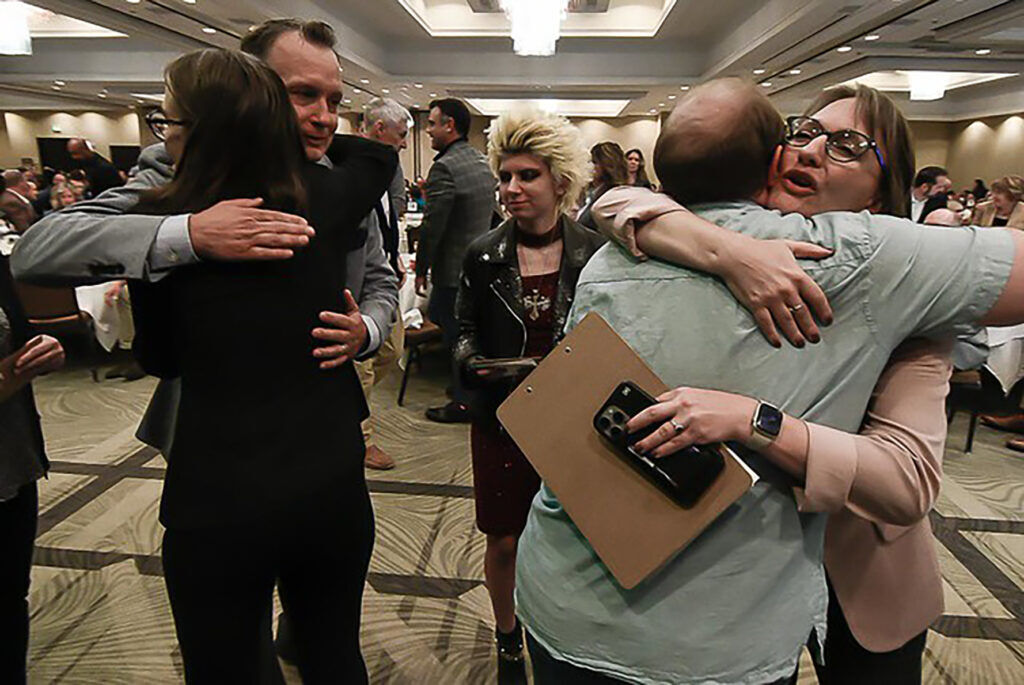The invisible friends Cat Price talked about in childhood were chalked up to an active imagination, and her adolescent angst and hostility got interpreted as teenage rebellion.
When, as a high school freshman in Colorado Springs, she had thoughts of suicide, began harming herself and experienced a full-blown psychotic break — during which she completely lost touch with reality and was hospitalized — people in her life realized something was wrong.
“People thought I was acting out on purpose or being a bad person,” she says. “It turns out, I was just struggling with mental illness.”
The internal mechanics of Price’s developing mind were at war, and when at age 18 she was diagnosed with schizophrenia, the news seemed catastrophic.
 Cat Price, 20, rocks the 1980s punk vibe on Thursday, Oct. 23, 2025, at her home. She started playing her mother’s old guitar about a year ago and loves the classic rock her father loves.(The Gazette, Christian Murdock)
Cat Price, 20, rocks the 1980s punk vibe on Thursday, Oct. 23, 2025, at her home. She started playing her mother’s old guitar about a year ago and loves the classic rock her father loves.(The Gazette, Christian Murdock)
Then another condition reared: Tourette syndrome.
“It was a shock to all of us; I had no family history. I didn’t want to believe it — I couldn’t accept it,” Price said. “My family was torn apart. We were at odds a lot. It was hard for them to navigate.”
Two years later, the difficulties seem manageable with medication, therapy and a village of support. Her family does “an amazing job,” she said, in helping her rise above the diseases.
And Price is working hard to turn a crippling situation into a personal public-awareness campaign, to bring understanding and acceptance for afflicted people and their families.
She was one of several speakers featured in a video shown at a recent fundraising event for the Colorado Springs office of the National Alliance on Mental Illness, or NAMI.
 Cat Price, center, is pictured at the National Alliance on Mental Illness’ annual fundraising dinner that was held Oct. 9 and raised more than $200,000 for the local office. Price is a volunteer group facilitator with NAMI and was featured in a video about how the organization helps people. (Photo courtesy of Bryan Oller)
Cat Price, center, is pictured at the National Alliance on Mental Illness’ annual fundraising dinner that was held Oct. 9 and raised more than $200,000 for the local office. Price is a volunteer group facilitator with NAMI and was featured in a video about how the organization helps people. (Photo courtesy of Bryan Oller)
“I’ve learned putting myself out there is beneficial,” Price said. “If I can help just one person, my day is made, my week is made.”
It was the first time the 20-year-old young woman addressed such a large crowd. But she pushed through her dread and told the audience of more than 700 attendees that while mental illness “can seem like a death sentence” and lead people to think their life is over, there is hope.
“There may be days we need to get hope and other days we need to give it,” she said.
Because, other speakers at the event said, the biggest risk for people with mental illness is hopelessness.
Schizophrenia is defined in the psychiatric field as a “serious mental illness.” Others include bipolar disorder, major depressive disorder, eating disorders, obsessive-compulsive disorder and post-traumatic stress disorder.
They’re different from the more common mental imbalances of anxiety and depression, which can last for a shorter time.
Nearly one in four Americans self-reported having any mental illness in the past year in the 2025 survey, “The State of Mental Health in America.”
About one in 20 adults have a serious mental illness, which affects day-to-day living often for a lifetime.
And less than 1% are diagnosed with schizophrenia, said Emily Brady, co-CEO of the local NAMI office.
“There’s a perception that it’s more common, but it’s fairly rare,” she said.
Though most people have heard of schizophrenia, many may not know what it means. The public face of the neurological condition is often seen in transient people yelling on the streets.
Price’s schizophrenia includes auditory, visual and tactile hallucinations.
She hears whispers and voices that tell her to hurt or kill herself. She sees bugs and frightening, shadowy figures that aren’t there. Sometimes it feels like someone is touching her.
Delusions, paranoia and psychosis also can alter reality for her.
“It’s 24/7. It doesn’t stop,” Price said.
Tourette syndrome, which Price initially brushed off as anxiety because it surfaced during the pandemic, adds uncontrollable tics that arrive in episodes and produce involuntary shaking of her head or hands, cussing and emitting random noises.
“It’s like a sneeze you can hold in for a time, and then it builds up and just happens,” Price explained.
Medication lessens the symptoms of both conditions but doesn’t eliminate them, she said.
Price has found her happy places, though. To quell the inner monsters, she naps frequently.
A sketchbook she’s had since ninth grade, the year things really went south, has become a friend that she carries everywhere and clutches dearly.
The pages depict her joys and struggles. Within are drawings of classic cars and hotrods, from memories of her dad taking her to car shows, as well as the faceless images that invade her mind.
Making art helps keep the darkness on the fringes instead of front-and-center in her head, Price said. She uses chalks, pens, acrylic painting and crayons to create artwork.
She also writes poetry, is teaching herself how to play the electric guitar and usually has headphones glued to her ears to quiet the madness that lurks.
“I wouldn’t wish it on anybody.”
A diagnosis of schizophrenia can be devastating, said Elisabeth Almond, a family nurse practitioner and medical director over five southern clinics for Peak Vista Community Health Centers. One of her children has the condition.
“It’s an unseen disability — it’s not clear to people,” she said.
But what is evident is that her son’s disorder seems to cause an “inherent fear” in others.
“Society judges it as you’re a bad parent, you did something wrong, or your kid did something wrong to cause it. People look for a reason our son is ill so it couldn’t happen to their family. And that makes it more devastating.”
Stigma manifests as people saying, “pull up your bootstraps,” or “get a job” or believing “it’s just poor behavior,” Almond said.
Schizophrenia is a neurological disorder that has a strong genetic predisposition and can be intertwined with environmental factors.
“Originally it was mistaken for early-onset Alzheimer’s because it changes the gray matter of the brain,” Almond said. “It’s an inflammatory process, and if not treated early you see degeneration of the brain and impairment of cognitive function.”
Unlike parents of a child who has cancer or a more typical chronic illness such as diabetes, Almond said most people don’t ask how her son is.
“Even medical providers act like it’s this unspeakable truth,” she said. “Our son is a beautiful human being who lives in terror literally all day long, and he works hard every day to survive. We think that should be seen rather than the fear or stigma.”
Regardless of which serious mental illness surfaces, one connecting thread is that all are isolating, Brady of NAMI said.
Price’s daily routine has limitations. She can’t drive; hallucinations cause her to see things in the road that don’t exist.
She can’t hold a job. She’s worried she’ll get nervous and her symptoms will flare, or a bad day will keep her from showing up.
She has a hard time socializing because she’s never sure how her mind and body will react, and forming thoughts into words becomes like one of those Scramble puzzles.
Navigating the mental health care system and finding the help their loved ones need can be a complex and confusing process for families, Brady said.
“Getting a diagnosis can be challenging because the illnesses present in different ways,” she said.
Treatment can shine the light of hope.
“It’s a treatable neurological disorder and disability they’ll have their whole lives, but they still live their lives,” Almond said.
After a few rocky years, her son is on an older drug, clozapine, which Almond read about in a book and tracked down to try. The medication has changed his life, she said.
She’s one of many advocates campaigning for clozapine, which is not branded and no longer stocked in pharmacies, to be revived for treating schizophrenia, for people who have tried other medications that haven’t worked well.
Peak Vista Community Health Centers and Colorado Mad Moms are hosting a free community lecture from the foremost national expert on the topic, from 8 a.m. to noon on Dec. 10 at the Peak Vista location at 2828 International Circle, Suite 120 in Colorado Springs.
Another issue with treatment is that some people with schizophrenia don’t think there’s anything wrong with their brain. Which is why some refuse to take medication.
“When you have that, it becomes difficult to have an individual be open or accepting of treatment,” Brady said.
Many patients and families cope by seeking refuge at NAMI, which offers support groups, educational classes, peer connection and events.
Last year, about 1,700 people attended a class or a group session, or called the office seeking resources, according to the organization’s annual report.
“We meet anyone wherever they’re at in their journey of health, which is a broad spectrum, from people struggling with anxiety for the first time to someone having an ongoing difficult time living with a serious mental health condition and maybe attempted to take their life and has had multiple hospitalizations,” Brady said.
“You are able to come as you and find you are welcome and safe here.”
A sense of peace came over Price when she first walked into NAMI in July 2023. She immediately knew she had found her people.
“NAMI saved my life,” she said. “They understand me.”
With spikey hair, dramatic black eye makeup and bright eye shadow, a short skirt, a leather jacket, fishnet stockings and chunky black boots, Price rocks the ‘80s punk vibe like she just jumped off a stage.
She adopted the fashion look about a year ago because it seemed to fit her love of classic rock-and-roll music (think Joan Jett), an affection she got from her dad.
“I realized the style is for me,” Price said. “I realized I’m an individual and shouldn’t be scared to express myself.”
Price now volunteers as a group facilitator at NAMI, so she can do for others what others did for her.
Life with schizophrenia and other serious mental illnesses can seem too heavy to bear on some days, Price said. But one thing she’s discovered in her journey is “you don’t have to carry it alone.”
Mental illness does not define success or who a person is, Brady said.
“Yes, there is a significant impact but with correct treatment, medication or therapy you can lead a full and healthy life that has purpose and meaning. And like Cat, you might be able to help others.”
Price rolls up her sleeve to flash a memorial tattoo with words from a congratulations card her best friend gave her when Price graduated from high school. A year ago, her friend, Alyssa, died after losing her battle with drug addiction and schizophrenia.
“Love you so much. So proud of you. Yeah! Love, Alyssa” is tattooed on Price’s forearm.
“Her family is my family. I spend time with her mom and dad, and we visit where her urn is at,” Price said.
Through all of her trials, Price sits with this: “I’ve learned that we need to make the best of life.”
A free community lecture by a national expert on schizophrenia treatment will be held from 8 a.m. to noon on Dec. 10 at Peak Vista Community Health Centers, 2828 International Circle, Suite 120, in Colorado Springs.
The main speaker, Dr. Rob Laitman, is a New York physician who specializes in the use of clozapine to treat treatment-resistant schizophrenia, schizoaffective and some bipolar disorders.
His wife, Dr. Ann Mandel Laitman, also will be presenting. The couple’s son, Daniel Laitman, was diagnosed with schizophrenia and is being treated with clozapine. He works as a Manhattan-based comedian and is defined as being in recovery from schizophrenia.
In his talk, “Clozapine Initiation and Management,” Dr. Rob Laitman will discuss a protocol he developed to guide prescribers through effective and safe initiation and management of clozapine, including how to handle side effects.
The event is for individuals and families affected by schizophrenia as well as medical professionals. It’s free but registration is requested. For more information and to register, go to https://www.peakvista.org/blog/community-lecture-on-schizophrenia-treatment.
A documentary, “Into the Light–Meaningful Recovery from Psychosis,” also will be shown, and Daniel Laitman, the comic, will perform.
Event sponsors are Peak Vista and Colorado Mad Moms, a group that advocates for legislation to improve conditions for people who have serious mental illness and is currently calling for more in-patient beds, changes to the competency process for offenders and other issues.
Clozapine is widely recognized as the gold standard for people who have not responded to other antipsychotic medication. It’s also the only Food and Drug Administration-approved drug for reducing suicide in schizophrenia disorders.
Research shows up to 70% of patients show improvement using clozapine.
An estimated 814,000 to 1.2 million Americans have treatment-resistant schizophrenia, yet only about 148,000 were prescribed clozapine.

